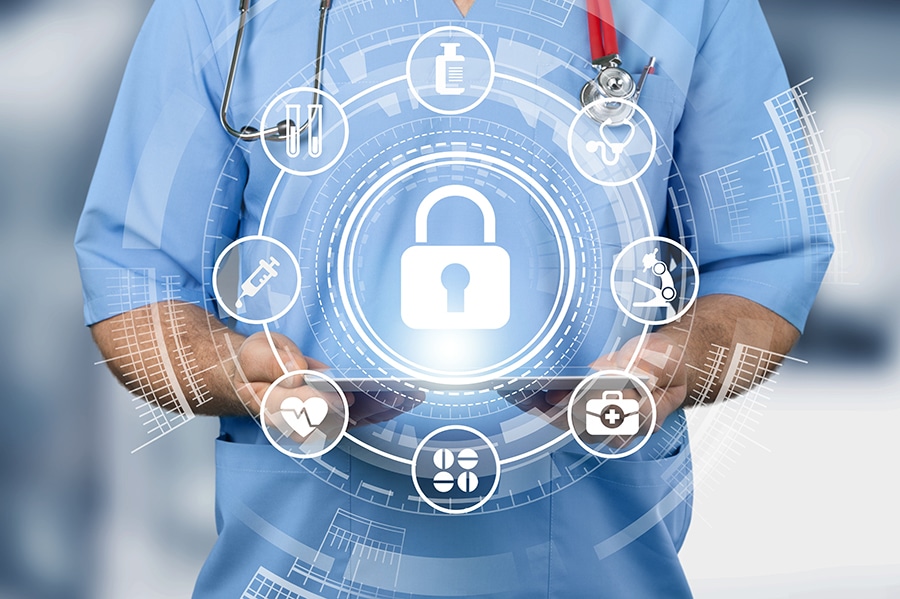
Healthcare cybersecurity solutions
A cyberattack can have serious consequences, such as data loss, identity theft, service disruption, and even reputational damage.
Fill in the form and we will call you back
Cyber Threats Facing Healthcare Organizations
- Ransomware: Attacks that block access to computer systems and demand a ransom to unlock them.
- Phishing: Fraudulent emails that attempt to trick users into revealing confidential information.
- Data breaches: Unauthorized access to computer systems and theft of confidential information.
- Malware: Malicious software that can damage computer systems or steal information.
Why Cybersecurity Solutions Are Essential for the Healthcare Sector
The healthcare sector needs cybersecurity services to protect confidential data, prevent service disruption, protect reputation, minimize financial costs, and comply with regulations.
Cybersecurity services can help healthcare organizations:
- Identify and mitigate security vulnerabilities.
- Implement security measures to protect their systems and data.
- Train healthcare personnel in cybersecurity.
- Develop an incident response plan to be able to respond quickly and effectively to a cyberattack.
Investing in cybersecurity services is an investment in patient safety, healthcare quality, and the financial health of healthcare organizations.


Cybersecurity Solutions for the Healthcare Sector
Advanced penetration testing services
Cyber intelligence services
Attack surface reduction services
Security assessment services
Protection and response services
Other
Cybersecurity FAQ for the Healthcare Sector
Why is the healthcare sector an attractive target for cybercriminals?
The healthcare sector is an attractive target for cybercriminals for several reasons:
- It handles large amounts of confidential data: Medical records and patient financial information are valuable information that can be used to commit fraud or identity theft.
- Computer systems are critical: The computer systems of healthcare organizations are essential for the delivery of healthcare. A cyberattack could disrupt these systems and endanger the lives of patients.
- Lack of resources: Healthcare organizations often have limited budgets and cannot invest in adequate security measures.
- Lack of awareness: Healthcare personnel are often not sufficiently aware of the risks of cybersecurity.
What are the most common types of cyberattacks in the healthcare sector?
The most common types of cyberattacks in the healthcare sector are:
- Ransomware: Ransomware attacks block access to computer systems and demand a ransom to unlock them.
- Phishing: Phishing emails attempt to trick users into revealing confidential information.
- Data breaches: Cybercriminals gain unauthorized access to computer systems and steal confidential information.
- Malware: Malicious software that can damage computer systems or steal information.
What measures can healthcare organizations take to protect themselves from hackers?
Healthcare organizations can take a number of measures to protect themselves from hackers, including:
- Investing in security measures: Implement firewalls, antivirus, intrusion detection systems, and other security measures.
- Training staff: Train healthcare personnel on the risks of cybersecurity and good security practices.
- Developing an incident response plan: Have a plan to respond quickly and effectively to a cyberattack.
- Keeping up with the latest threats: Follow the latest cybersecurity news and update security measures accordingly.
What resources are available to help healthcare organizations improve their cybersecurity?
There are a number of resources available to help healthcare organizations improve their cybersecurity, including:
- Government agencies: Government agencies such as the National Cybersecurity and Communications Integration Center (NCCIC) offer information and resources on cybersecurity.
- Professional organizations: Associations such as the Healthcare Information and Management Systems Society (HIMSS) offer resources and training on cybersecurity in the healthcare sector.
- Cybersecurity companies: Cybersecurity companies, like Tarlogic, offer a wide range of services to help healthcare organizations improve their security.